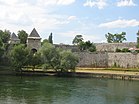Banjaluka
|
Banja Luka Бања Лука |
|||||
|---|---|---|---|---|---|
| City | |||||
Clockwise from top: Panoramic view of Banja Luka, Cathedral of Christ the Saviour, Kastel Fortress on the left bank of the Vrbas River
|
|||||
|
|||||
 Location of Banja Luka (municipality) within Republika Srpska |
|||||
| Coordinates: 44°46′N 17°11′E / 44.767°N 17.183°ECoordinates: 44°46′N 17°11′E / 44.767°N 17.183°E | |||||
| Country | Bosnia and Herzegovina | ||||
| Entity | Republika Srpska | ||||
| Region | Bosanska Krajina | ||||
| Government | |||||
| • Mayor | Igor Radojičić (SNSD) | ||||
| Area | |||||
| • Total | 1,238.91 km2 (478.35 sq mi) | ||||
| Elevation | 163 m (535 ft) | ||||
| Population (2013 census) | |||||
| • City |
City:185.042 Urban:199.191 |
||||
| Time zone | CET (UTC+1) | ||||
| • Summer (DST) | CEST (UTC+2) | ||||
| Postal code | 78000 | ||||
| Area code(s) | +387 51 | ||||
| Website | Official website | ||||
City:185.042
Banja Luka (Cyrillic: Бања Лука, pronounced [bǎɲa lǔːka]) or Banjaluka (Cyrillic: Бањалука) is the largest city of the Republika Srpska entity and second largest city in Bosnia and Herzegovina after the capital Sarajevo. Traditionally, it has been the centre of the Bosanska Krajina region, located in the northwestern part of the country. It is home of the University of Banja Luka, as well as numerous state and entity institutions of Bosnia and Herzegovina. The city lies on the River Vrbas and is well known in the countries of the former Yugoslavia for being full of tree-lined avenues, boulevards, gardens, and parks. According to the 2013 census the City of Banja Luka, has 185,042 inhabitants.
The name "Banja Luka" was first mentioned in a document dated 6 February 1494, by Vladislav II. The name is interpreted as "Ban's meadow", from the words ban ("a medieval dignitary"), and luka ("a valley" or "a meadow"). The identity of the ban and the meadow in question remain uncertain, and popular etymology combines the modern words banja ("bath" or "spa"), or bajna ("marvelous") and luka ("port"). A different interpretation is suggested by the Hungarian name "Lukácsbánya", i.e. "Luke's Mine", which is also the meaning of Slovak "Banja Luka". In modern usage, the name is pronounced and usually declined (u Banjaluci) as one word, and often written as such; the citizens reportedly prefer the form with inflected adjective (u Banjoj Luci).
...
Wikipedia




